#classical etude
Text
Franz Liszt (1811-86) - "Mazeppa" Transcendental Étude No. 4 for Piano in d-minor, S. 139. Performed by Fred Oldenburg, 1842 Érard piano.
#franz liszt#romanticism#classical music#piano#pianist#period performance#period instruments#etude#transcendental etude#liszt#fortepiano#pianoforte#keyboard#erard piano#chamber music
25 notes
·
View notes
Text
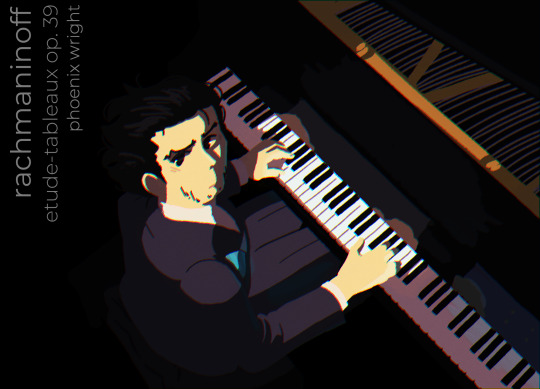
“… the music feels like imminent doom, like the whole world is going to come crashing down on you any second, and there’s nothing to stop it… fitting for a set written just before the revolution and the composer forced to flee to protect his family, never the same and never to return…”
accompanied text
no text version below

#myart#ace attorney#aa classical musicians au#phoenix wright#i love the etude tableaux set#also if you see any resemblance/nods to aa4 or the 7yg it’s probably intentional :)#oh i have a lot of thoughts on 7yg and phoenix’s musical journey#Spotify
12 notes
·
View notes
Text
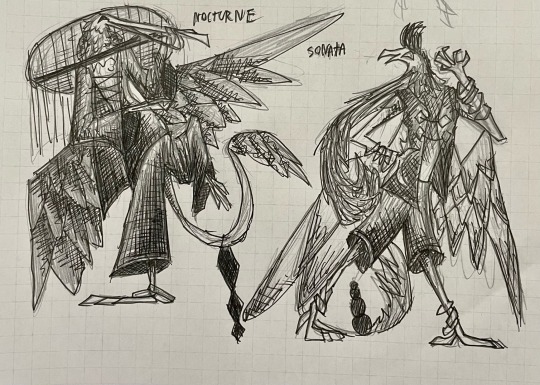
Fooling around with more fantastical designs for the Layered Earth.
Nocturne and Sonata here were normal people, once, but they got a little too cuddly with some particularly weird magic artifacts, and now they’re, uh, not quite Angels and not quite Prophets. Angels are defined by their still being human but not having proper Humanity, and prophets by their being beyond human while retaining their all important capital-H Humanity. These two are more like… if something wanted to be part of Humanity, picked two weird college kids to be their models, kinda-possessed-kinda-replaced-kinda-cloned said college students and now they’re weird leggy army birdie thingies with twice the dramatic dispositions, and three times the urge to sing a capella in many-part harmony, and four times the audacity to dress like that.
Edit to say please click for better quality why do the pixels always get murdered
Close ups under the cut


#worldbuilding#layered earth#sketch#creature drawing#character design#anthro#technically? i mean theyre bird people not people people#look into nocturnes dead skull eyes and tell me he never dreamed of being a bird in middle school#ironically nocturne is not a night owl by any definition of the word#but he does like spoopy things like foraging bone bits and sewing by hand#sonata will probably have tattoos eventually i just dont know what she wouldnt want on her arms or legs#she very much gives biker but on a scooter vibes#i dont even know what that will look like but its her to a t#more weirdos like these to come#all of whom will be named after types of classic songs#tocata overture prelude symphony fuge aria concerto suite minuet waltz etude etc#rondo rhapsody ballet opera and the like#is it clear that im a music nerd
7 notes
·
View notes
Text
youtube
I figured maybe we would class the joint up a little. This recording is from '71--I'm tempted to say that this is Parkening at the height of his powers, but he's only 23 here and yet still only five years out from recording Parkening and the Guitar and going on his years-long hiatus.
Etude No. 1 is elegant and economical and ends up with that landing that sounds like it's about to launch "Roundabout."
9 notes
·
View notes
Text
youtube
Heitor Villa-Lobos (1887 - 1959) - 12 Etudes for guitar (1928/1929)
Etude No. 1 in E Minor - Allegro non troppo 00:00 Etude No. 2 in A Major - Allegro 02:03 Etude No. 3 in D Major - Allegro moderato 03:01 Etude No. 4 in G Major - Un peu modéré 05:36 Etude No. 5 in C Major - Andantino 09:11 Etude No. 6 in E Minor - Poco allegro 12:04 Etude No. 7 in E Major - Tres animé 13:42 Etude No. 8 in C-Sharp Minor - Modéré - Lent 16:14 Etude No. 9 in F-Sharp Minor - Très peu animé 19:14 Etude No. 10 in B Minor- Très animé 22:32 Etude No. 11 in E Minor - Lent 26:13 Etude No. 12 In A Minor - Animé 30:20
Andrzej Wilkus, guitar
3 notes
·
View notes
Text
I think I should be allowed to maul classical pianists for never slowing down and making hard, yet extremely boring and repetitive pieces that I wouldn't wish even my worst enemy to do
#GUESS WHO HAS A RECITAL IN A MONTH#I might try and coax my teacher into letting me swap pieces and not do this bullshit I hate this piece so much#Every time I open and look at it I gag#Baroque and romantic era pieces are great but I HATE CLASSICAL#Etudes are lovely as well BUT CLASSICAL SUCKS#I don't wanna play this shit when I'm a nervous wreck and preforming in front of people#I like slower and more methodical songs anyways as opposed to this nightmare#sp-rambles#Just one more recital and I'm free I can never touch a piano again in my life#The piano is a wonderful intstrument but I do fully mean it when I say I don't have a soulful or artistic connection at all to it#I don't feel emotionally connected at all to it as I do with writing per se#Which is funny since my father insists that one day I'll have my heart broken and just sit down at the piano and play something#I'm not a pianist nor a musician I just play the piano#There's a key difference
6 notes
·
View notes
Text
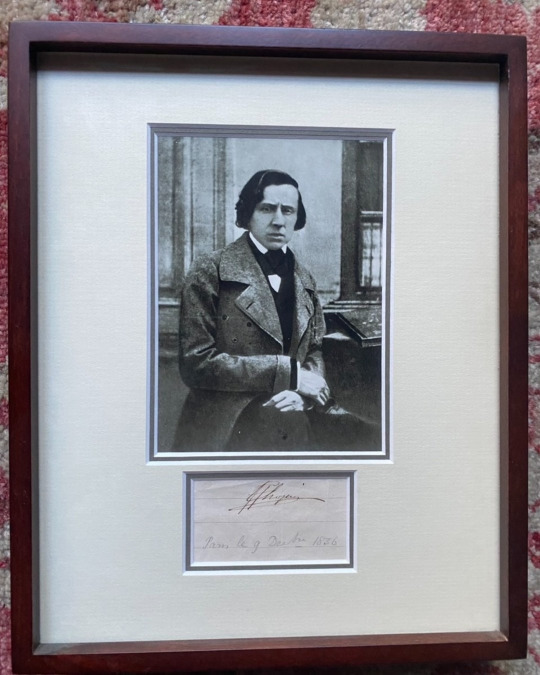


OTD in Music History: Legendary pianist-composer Frederic Chopin (1810 – 1849) makes his last public appearance on a concert platform at the Guildhall in London in 1848. As a patriotic gesture, he plays at a benefit held for Polish refugees; unfortunately, this proves to be both a futile and taxing mistake, since more of the attendees at this event are far more interested in dancing and imbibing refreshments than in listening to Chopin’s artistry, and the exertion leaves him feeling even more drained and weak than he was before. Chopin weighs less than 100 lbs and is already terminally ill from the tuberculosis that will kill him in less than a year…
PICTURED: A beautiful example of Chopin's "classic" full signature, dated in pencil by another contemporaneous hand – probably that of celebrated cellist August Franchomme (1808 – 1884). This example originates directly from the Franchomme estate. Franchomme was the most celebrated French cellist of his time, and he forged close friendships with both Chopin and Felix Mendelssohn (1809 - 1847). In 1833, Chopin and Franchomme collaborated to write a "Grand Duo concertant" for piano and cello, based on themes from Giacomo Meyerbeer's (1791 - 1864) hit 1831 opera, "Robert le diable". Franchomme also rewrote the cello parts for Chopin's "Polonaise Brillante" (Op. 3), and was the dedicatee of Chopin's Cello Sonata (Op. 65).
Based on comparison with other known examples, and taking into account both the date and the lined paper, it seems very likely that this example was cut from a receipt for royalties paid to Chopin by the Pleyel publishing firm for the sale of some of his original compositions. Assuming that the date written beneath this signature is accurate, Chopin had just met his lover Aurore Dupin (better known by her pen name “George Sand”) (1804 - 1876) for the first time at a party a few weeks before his put pen to paper here.
#Frederic Chopin#Frédéric Chopin#Fryderyk Chopin#music history#classical music#composer#Chopin#piano#pianist#sonata#etude#nocturne#polonaise#mazurka#ballade#orchestra#symphony#concerto#music
46 notes
·
View notes
Text
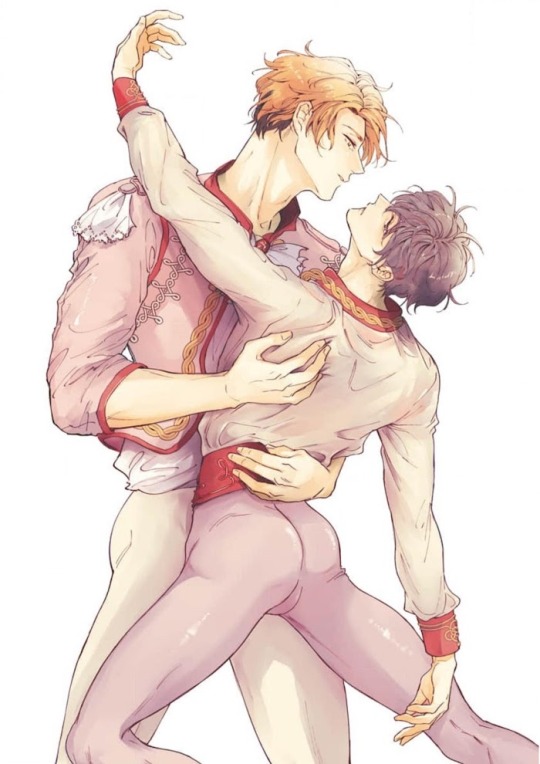
Houkago no Etude, by Hirune Cyan
#houkago no etude#Hirune Cyan#classical ballet#放課後のエチュード#ballet#ballet art#male ballet dancer#ballet manga#sports manga#dance manga#manga blog#romance manga#lgbt manga#beautiful art#coloured manga#manga aesthetic#mangacore#manga art#school life manga#drama manga#manga and anime#manga community#manga reading#manga recommendation#manga reccs#shounen ai#bl manga
10 notes
·
View notes
Text
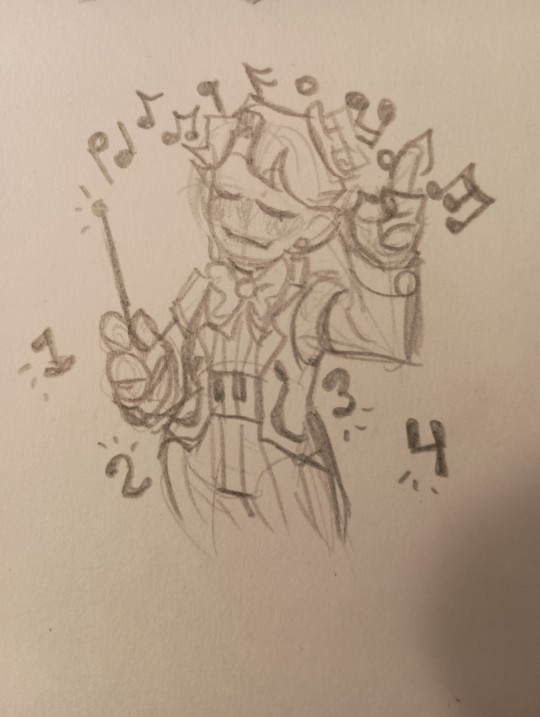
he's just boppin to some tunes!!!
#probably like. lacrimosa or etude op 25 no 11 in a minor. or blood moon waltz#classical ass#tadc#tadc oc#camosocs#camosart
5 notes
·
View notes
Text
what's your role in the tragic play?

sweet supporting character
i wanna be your grandma so bad, please let me pinch your face and knit you a sweater. you're most likely the best friend of the protagonist, and there's some possible overlap between you and the narrator. you're sweet and try very hard to be selfless. you watch the ones you love descend into darkness, and make every effort to help them through it all. it's not enough. you keep trying to make it enough. you provide comic relief, a listening ear, a hug, advice── any method of support you can think of. your own personal tragedy isn't documented. sometimes you wish it was, even though you're the one who ensures it is not. you want people to care for you the way you do for others. but you refuse to ask for it, so you wait for others to read between the lines. they usually don't. at least you're the one who gets to survive the tragedy. no matter how many times you beg to trade places, it is always you at the end, sitting at someone else's grave.

tortured love interest
you're so hot. sorry about the horrors. you're the kind of person people immediately notice. whether you have a distinct style, are more outgoing, or are just plain beautiful, you make an impression. people usually feel the need to protect you, which probably frustrates you to no end. you're not weak! you're not fragile! you're not helpless! but the people in your life tend to disagree. maybe it's your lover, the protagonist, trying to keep you out of their own turmoil. maybe it's someone responsible for you in some way, keeping you away from your lover, while they head down an increasingly dark path. regardless, all you really want is a sense of autonomy! unfortunately, you're very likely to die before that happens. the audience will be so caught up in the grief your death causes the protagonist that they forget to grieve you as a person. you deserved better, but unfortunately this is not your story. maybe it should have been.
Tagged by: @miasmaburnt
Tagging: @possepink, @memoryoflost, @luminousglimmer
#a game of tag;; dash meme#curious fourth replica (etude)#magical lollipop drops (ramuda)#[etude had one other answer multiple times but. we going with this one for the classic unreliable narrator angle!]#[but ramuda's is SO FUNNY. he's so hot. he's going to die. this quiz is hitting it where it counts]#[his conflict is literally about his personhood. just clone things <3]
2 notes
·
View notes
Text
Moszkowski Petit Etude, Op. 91 n.6
21 de março, 2023
youtube
2 notes
·
View notes
Text
José Zayas (d. 1804) - Última lección for Cello and Continuo in B-flat Major (from Manuscrito de Barcelona). Performed by Josetxu Obregon, cello & direction, and La Ritirata on period instruments.
#jose zayas#classical music#classicism#cello#harpsichord#period performance#period instruments#rarely performed composers#cellist#strings#chamber music#ultima leccion#etude
20 notes
·
View notes
Video
youtube
Cécile Chaminade (French, 1857–1944) - 6 Études de concert, Op.35: No. 2 “Automne”
#6 Études de concert#Six Concert Etudes#Cecile Chaminade#Cécile Chaminade#classical music#romantic period#romantic era#music#piano music#piano#etudes
2 notes
·
View notes
Text
guys if i start piano lessons again are there any classical pieces you think i should learn?
#i did around six years of lessons for reference of what level im at#but that started with the complete basics music theory for kids stuff#the most recent songs i can remember playing were called etude e-moll and wiegenliedchen#so if those mean anything to you then that’s how much of a difficult song i can play#but like i can also do stuff like. sacrifice from the rwby soundtrack is one of the songs i learned#anyway i have at least one friend who likes classical music so im just wondering if you have any suggestions#i’ll probably just be paging through das pianobuch otherwise#im just really missing playing classical music rn#but hey also if there’s like. mechanisms. or something. that you think i should learn. that works too#also i have work in around forty five minutes so here’s my advance warning on that#so yeah#taking suggestions but no pressure#me. my post. mine.
4 notes
·
View notes
Text
Etude in E major by F. Chopin “Tristesse”
youtube
1 note
·
View note
Text
youtube
Ignaz Moscheles (1794–1870) - 24 Etudes Op. 70
Fausto Bongelli, piano
3 notes
·
View notes